Looking for low-cost futures trading platforms in 2026? Here’s what you need to know:
Discount futures brokers are ideal for experienced traders who value low fees, advanced tools, and efficient execution. This guide highlights the top brokers based on costs, tools, and features to help you make an informed choice.
Key Takeaways:
- AMP Futures: Low commissions, no platform fees, $100 minimum deposit, and 20 commission-free trades for new users.
- IronBeam: Free platform access, free real-time market data for non-professionals, and no recurring fees.
- TradeStation: Tiered commission rates, free platform for futures accounts, and advanced tools like EasyLanguage for automation.
- NinjaTrader: Free core platform with advanced charting, backtesting, and trade simulation.
- EdgeClear: Flexible commissions, free professional-grade platforms, and integrated risk management tools.
- Interactive Brokers: Tiered pricing starting at $0.85 per contract, free Trader Workstation, and $10,000 minimum deposit.
- Webull Futures: Simple pricing, free platforms, low minimum deposit, and paper trading for beginners.
- E*TRADE Futures: Straightforward fees, essential tools, and strong educational resources.
- Charles Schwab Futures: Consistent pricing, no platform fees, and robust research tools.
- Optimus Futures: Tiered pricing, flexible deposit requirements, and personalized support.
Quick Comparison
| Broker | Commission Rates | Platform Fees | Minimum Deposit | Key Features |
|---|---|---|---|---|
| AMP Futures | Matches/Beats quotes | None | $100 | 20 free trades, no inactivity fees |
| IronBeam | Free for non-pros | None | Varies | Free real-time market data for CME |
| TradeStation | Tiered rates | None | Varies | Advanced tools, automation via EasyLanguage |
| NinjaTrader | Free core platform | None | Varies | Advanced charting and trade simulation |
| EdgeClear | Flexible rates | None | Varies | Risk management tools, direct market access |
| Interactive Brokers | $0.85+/contract | None | $10,000 | Global access, algorithmic trading |
| Webull Futures | Simple pricing | None | Low | Beginner-friendly, paper trading |
| E*TRADE Futures | Straightforward | None | Varies | Educational resources, market analysis |
| Charles Schwab | Consistent rates | None | Varies | Research tools, integrated services |
| Optimus Futures | Tiered rates | None | Flexible | Personalized support, direct market access |
Choose a broker that aligns with your trading style, budget, and volume. High-volume traders might prefer AMP Futures or IronBeam for lower fees, while beginners might opt for Webull or E*TRADE for simplicity and education. Advanced tools? Check out TradeStation or NinjaTrader. Always consider fees, tools, and support before deciding.
3 Brokers I Recommend to My Team (everything you need to know)
1. AMP Futures
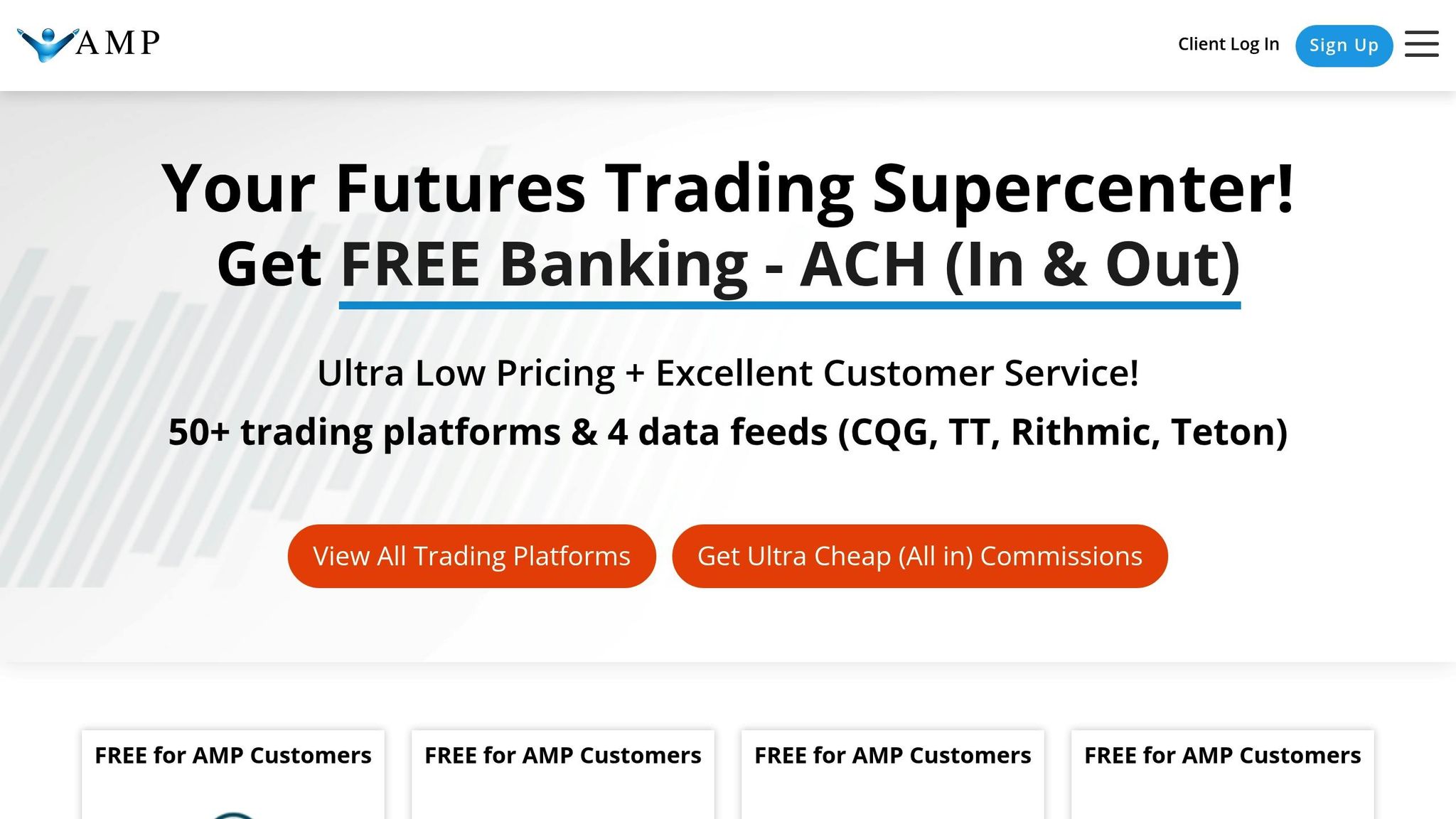
AMP Futures stands out as a budget-friendly choice in the futures trading world, making it a great option for traders looking to keep costs low. Their focus on affordability is evident through their commission-match guarantee and transparent pricing. Here’s a breakdown of their fee structure and other features.
Commission Rates
AMP Futures promises to beat or match any written commission quote. On top of that, new traders can enjoy 20 commission-free trades when they open an account. This perk gives beginners a chance to explore the platform without worrying about upfront costs.
Platform Fees
One of AMP Futures’ biggest advantages? No monthly platform fees. They offer access to fully functional versions of advanced trading platforms without charging extra.
Minimum Deposit
To get started, AMP Futures requires just a $100 minimum deposit to open and activate a live trading account. However, the actual amount you’ll need depends on the day trading margin requirements for the specific futures contracts you plan to trade.
Additional Perks
AMP Futures also provides access to multiple professional trading platforms and doesn’t charge inactivity fees, making it a flexible and trader-friendly option.
2. IronBeam
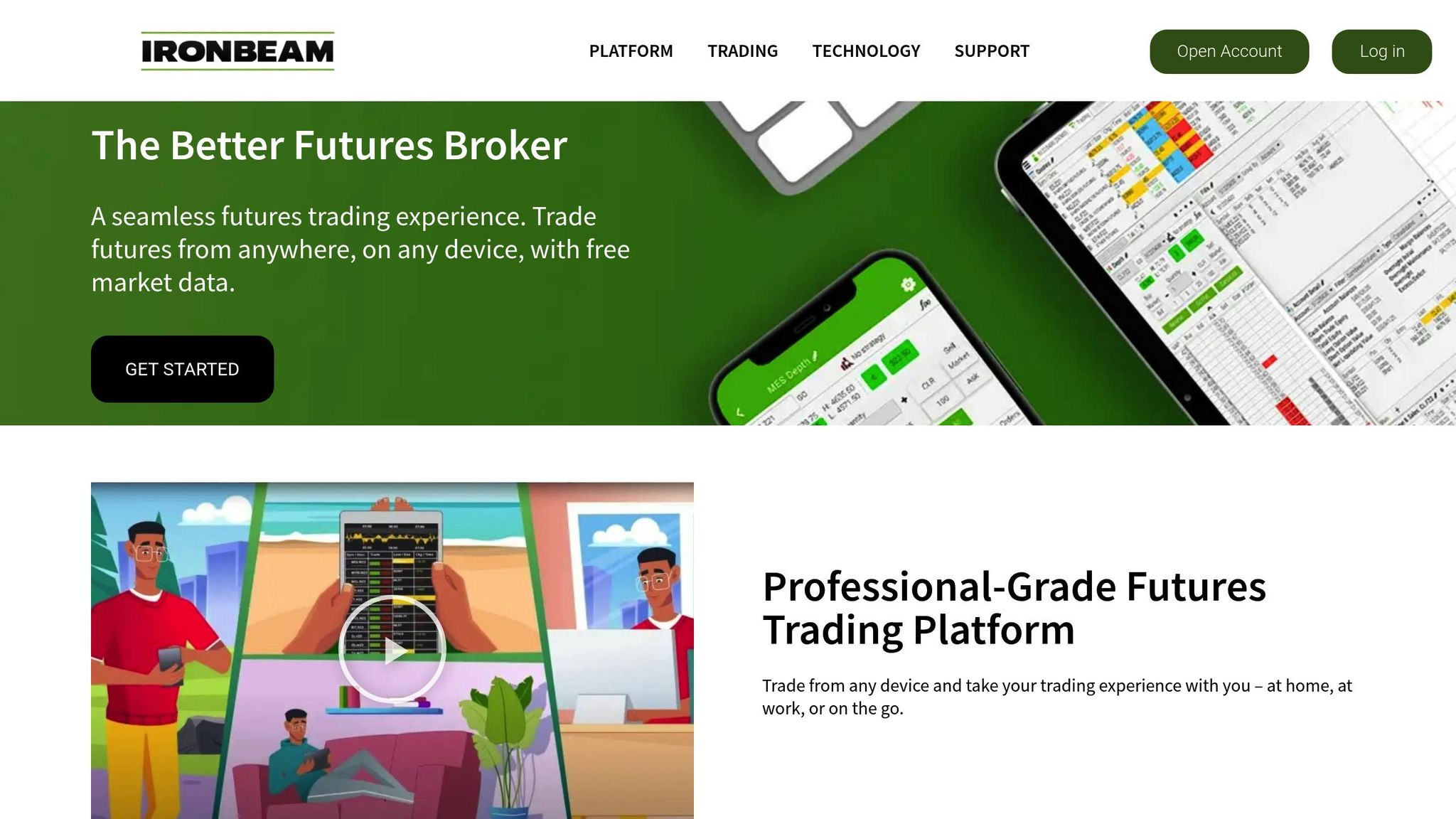
IronBeam follows AMP Futures’ approach by keeping costs low for traders. It offers free access to its trading platform and market data, making it an attractive option for those who want professional-grade tools without worrying about recurring fees.
Platform Fees
The IronBeam trading platform, including its mobile app, is completely free for all users. This means traders get access to a full suite of tools without having to pay any monthly subscription fees.
Additional Perks
One standout feature of IronBeam is its policy on market data. Non-professional traders using the IronBeam platform receive free real-time Level 1 (top-of-book) and Level 2 (full depth of market) data for CME Group exchanges. This service, which would typically cost $39 per month, includes data for major exchanges such as CME/GLOBEX, CBOT, COMEX, and NYMEX bundles.
For professional traders, the same CME data is available at a cost of $119.80 per month.
Note: Market data fees apply to professionals and to non-professionals using third-party platforms.
3. TradeStation
TradeStation stands out by blending cutting-edge technology with low costs, making it a go-to platform for active traders. Known for its advanced tools and transparent pricing, it offers a robust experience tailored to those who trade frequently. Let’s dive into its fee structure, platform features, and some added benefits for traders.
Commission Rates
TradeStation has a pricing model that rewards high-volume traders. Its tiered commission structure means the more you trade, the lower your fees. On top of that, all exchange and regulatory fees are passed through at cost, giving you a clear picture of your total expenses without hidden charges.
Platform Fees
Good news for futures traders: TradeStation’s platform is completely free for futures trading accounts. That includes access to their desktop software, mobile apps, and web-based tools. There are no recurring platform fees, so you can use advanced features like charting tools, technical indicators, and order management systems without worrying about extra costs. Plus, for traders who like to automate their strategies, TradeStation’s proprietary programming language, EasyLanguage, is built right into the platform.
Additional Perks
TradeStation goes the extra mile by offering free, real-time futures market data and a wide range of educational resources, including webinars and trading courses. For those running automated strategies, the platform integrates seamlessly with third-party VPS hosting, ensuring stable connectivity and quick execution. Advanced tools like OptionStation Pro and RadarScreen are also included, making it easier to track multiple markets at once. These features add even more value for traders who need powerful tools to stay ahead.
4. NinjaTrader
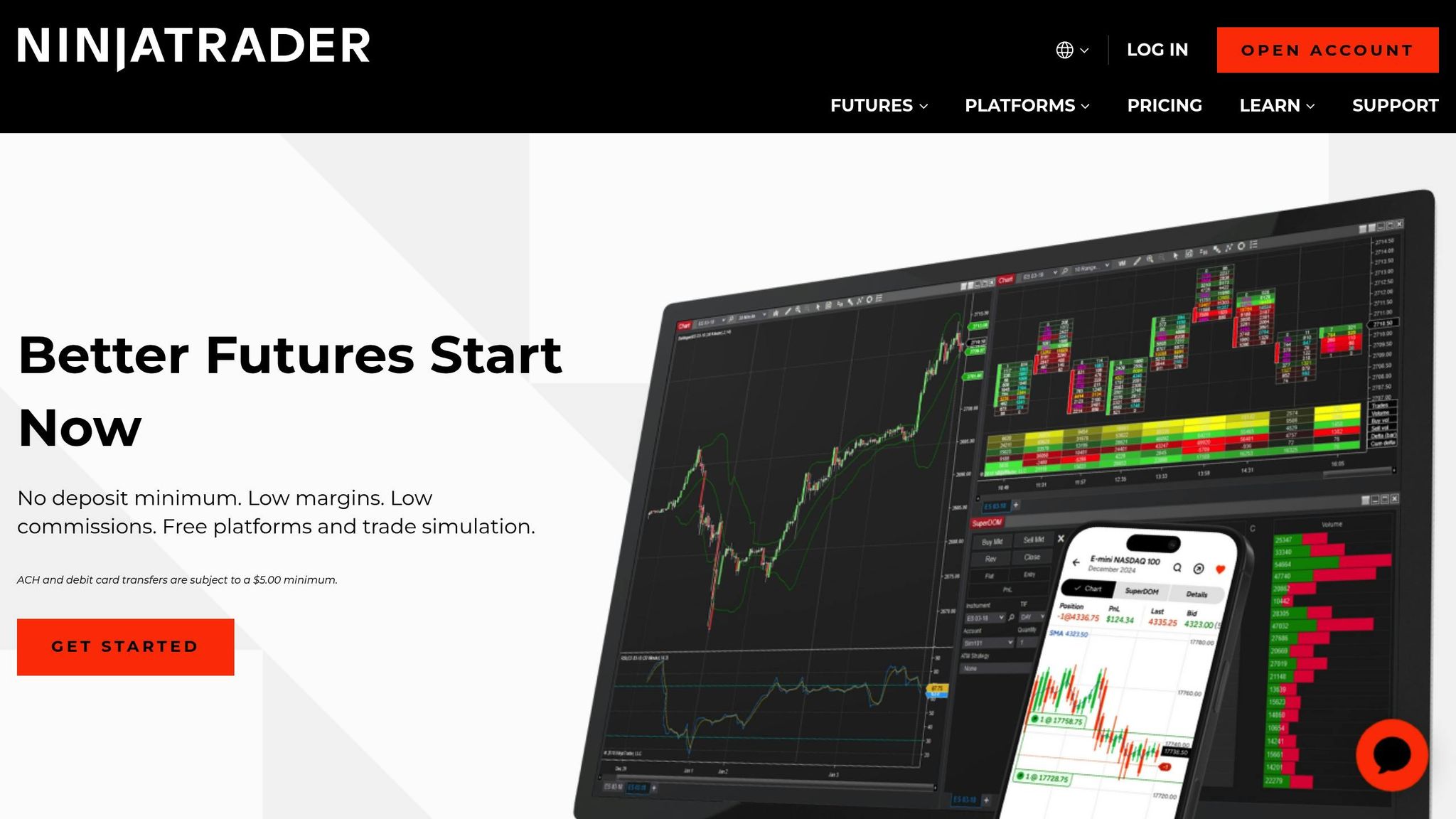
NinjaTrader offers its core trading platform at no cost, which includes advanced charting, backtesting, and trade simulation. This allows traders to refine and test their strategies without needing to pay for additional software. This free platform stands out among other budget-friendly options, giving traders powerful tools to fine-tune their approach without added expenses.
5. EdgeClear
NEVER MISS A TRADE
Your algos run 24/7
even while you sleep.
99.999% uptime • Chicago, New York, London & Amsterdam data centers • From $59.99/mo
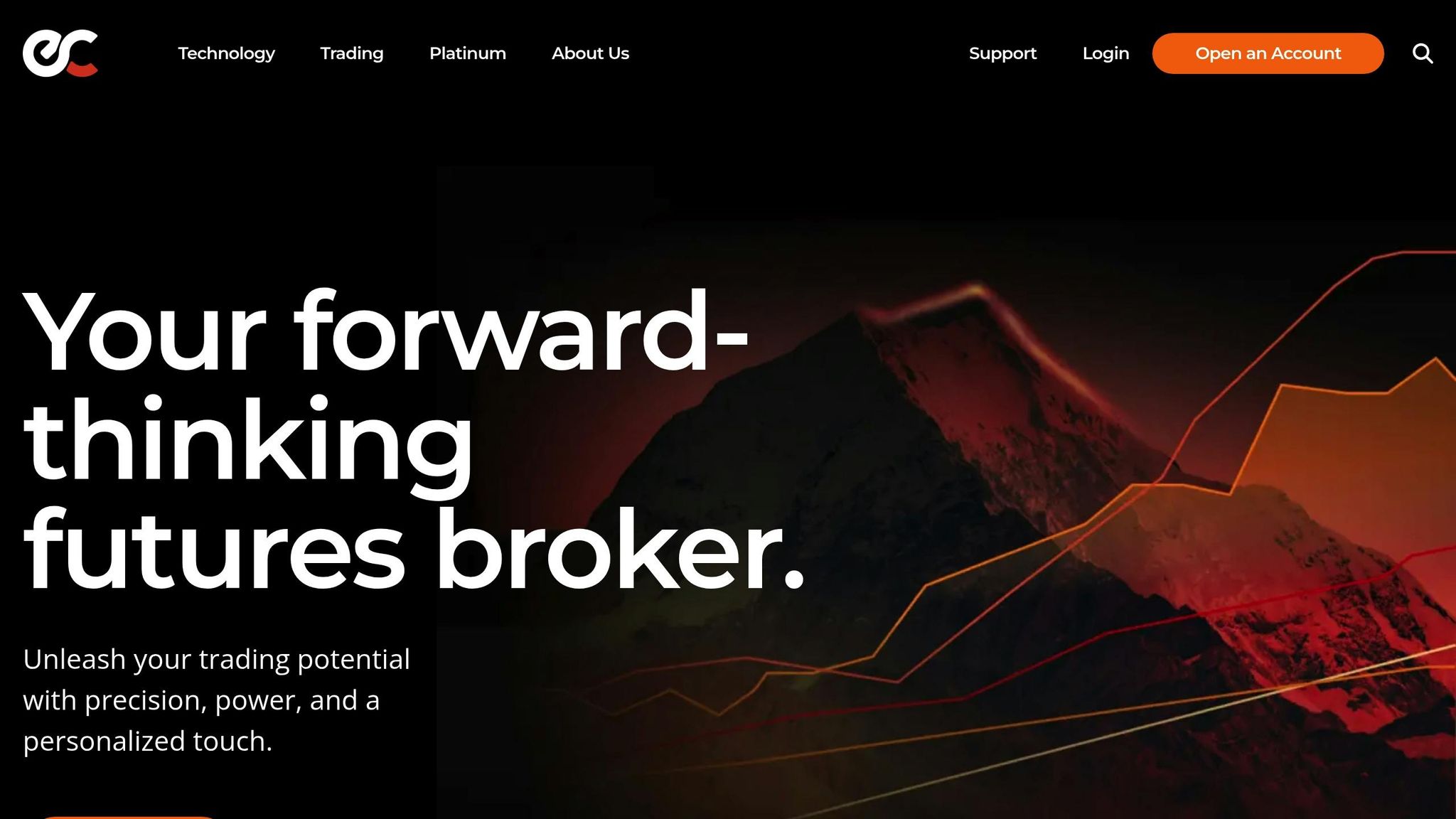
EdgeClear is designed for active traders, offering direct market access and competitive pricing.
Commission Rates
EdgeClear offers flexible commission rates that can be adjusted based on your trading volume. If you’re a high-volume trader, it’s worth reaching out to EdgeClear to discuss potential discounts.
Platform Fees
One of EdgeClear’s standout features is access to professional-grade trading platforms without any extra monthly fees. Whether you prefer third-party trading software or EdgeClear’s proprietary web-based platform, you’ll have tools like real-time market data, advanced charting, and order management at your fingertips.
Minimum Deposit
To get started with EdgeClear, you’ll need to meet a minimum deposit requirement. The broker also supports micro futures, making it accessible for traders with smaller accounts. Be sure to check their current deposit limits.
Additional Perks
EdgeClear provides added value through features like free real-time market data, integrated risk management tools, and direct market access for fast order execution. Their customer service team is knowledgeable in futures trading, ensuring you get the support you need.
For the latest information on fees, platforms, or account requirements, it’s best to contact EdgeClear directly.
6. Interactive Brokers
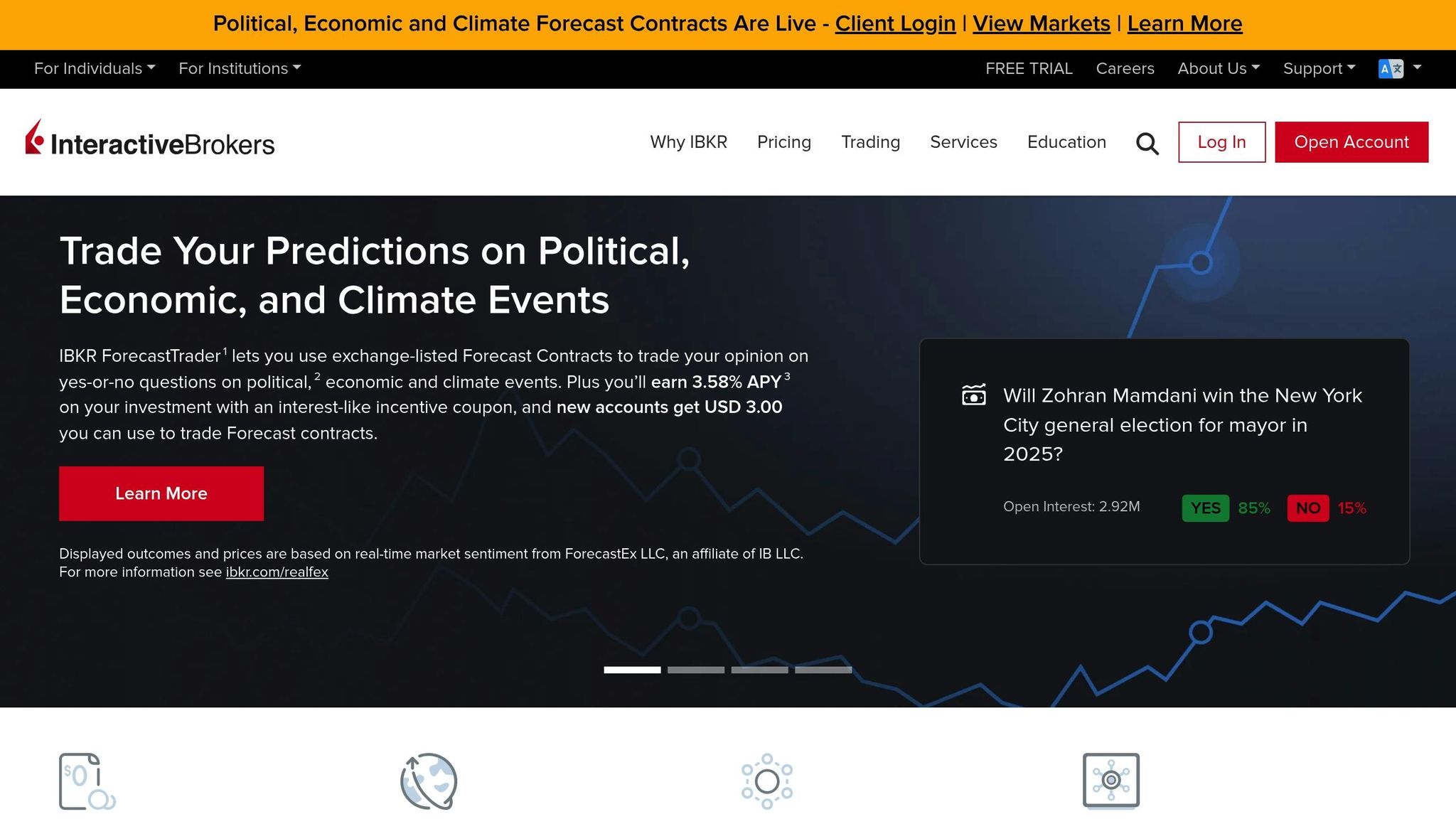
Interactive Brokers stands out as a strong choice for U.S. traders seeking low-cost futures trading and advanced tools.
Commission Rates
Interactive Brokers (IBKR) offers two pricing models: tiered and fixed. The tiered pricing starts at about $0.85 per contract, with discounts available for higher trading volumes. For those who prefer predictability, the fixed pricing option comes at a slightly higher rate but provides consistent costs. Both options align with IBKR’s goal of keeping fees competitive. Additionally, their platforms come with no extra charges, adding to their cost efficiency.
Platform Fees
Traders can use the Trader Workstation (TWS) software for free, which includes features like advanced charting tools, algorithmic trading capabilities, and direct market access to exchanges around the globe. For those on the go, the IBKR Mobile app offers full functionality for futures trading – also without platform fees. However, keep in mind that market data fees may vary depending on the exchange.
Minimum Deposit
Interactive Brokers requires a minimum deposit of $10,000, which reflects its focus on catering to active and professional traders. This deposit grants access to a wide range of tools and global market connectivity. For eligible accounts, portfolio margining is available, potentially lowering margin requirements for traders handling more complex positions.
Additional Perks
IBKR provides institutional-level tools that are typically found in professional trading environments. These include advanced order types, algorithmic trading strategies, and integrated risk management tools to help monitor positions and margin usage effectively. With a single account, traders can access futures markets worldwide, covering currency, equity index, and commodity contracts. The platform also delivers detailed reporting tools for performance analysis and tax preparation, alongside reliable customer support during market hours. Moreover, active traders may benefit from exchange rebates, further reducing overall trading costs.
7. Webull Futures
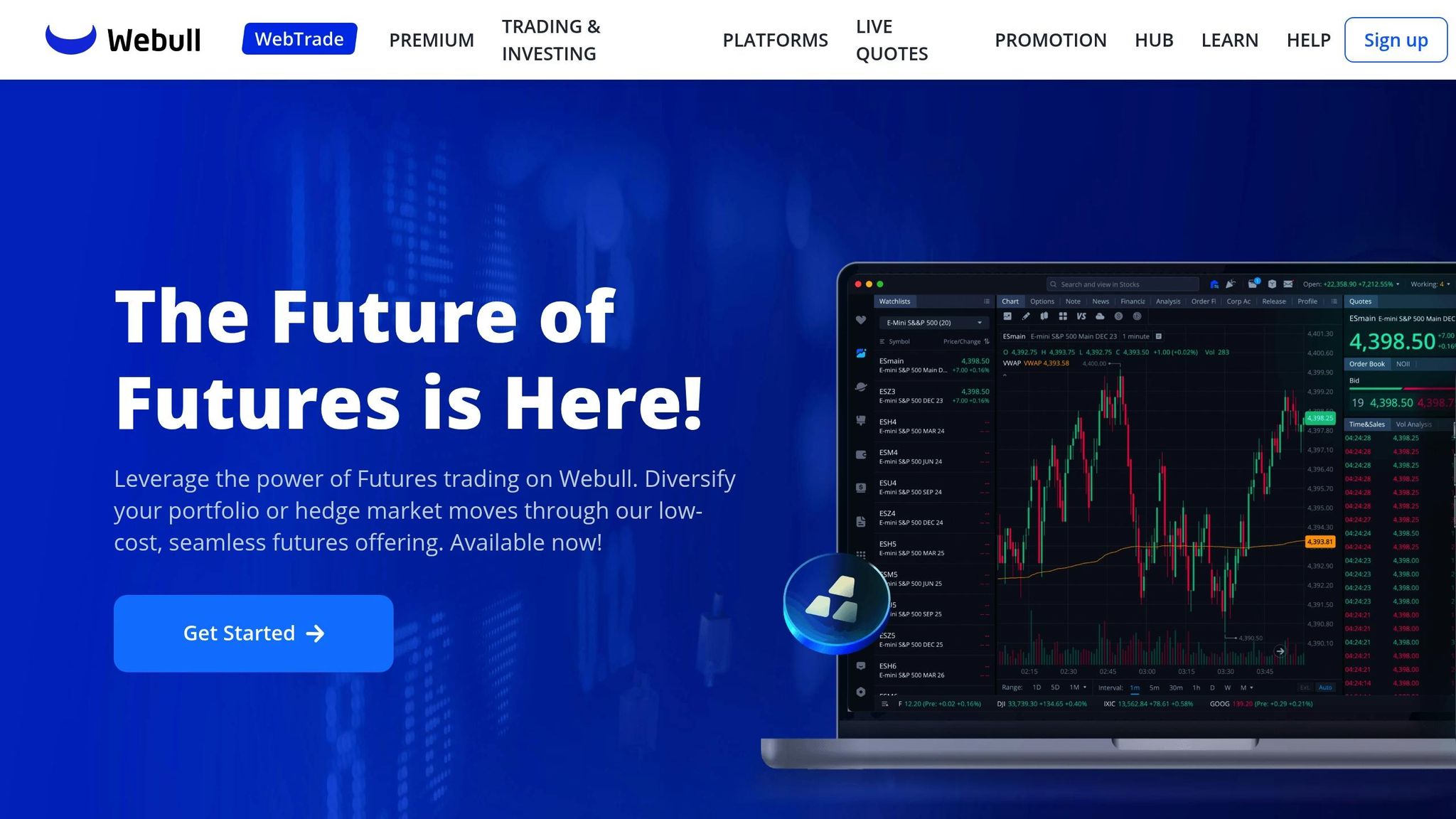
Webull Futures stands out as an affordable choice for traders who want to explore the futures market without worrying about excessive fees. It offers a balance of low costs and user-friendly tools, making it a strong contender in the competitive trading space.
Commission Rates
Webull Futures keeps things simple with a clear per-contract pricing model. There are no confusing tiers or hidden fees, so traders know exactly what they’re paying.
Platform Fees
Both the desktop and mobile platforms from Webull are free to use, and they come equipped with real-time market data and advanced charting tools. However, if you want access to premium data feeds, there may be extra charges.
Minimum Deposit
One of Webull Futures’ most attractive features is its low minimum deposit. This makes it easier for new traders or those with smaller accounts to get started in the futures market without breaking the bank.
Additional Perks
Webull offers a range of extras to enhance the trading experience, including customer support during market hours, paper trading to test strategies without risk, and educational resources. Plus, its social trading features let users connect and learn from others in the community.
8. E*TRADE Futures
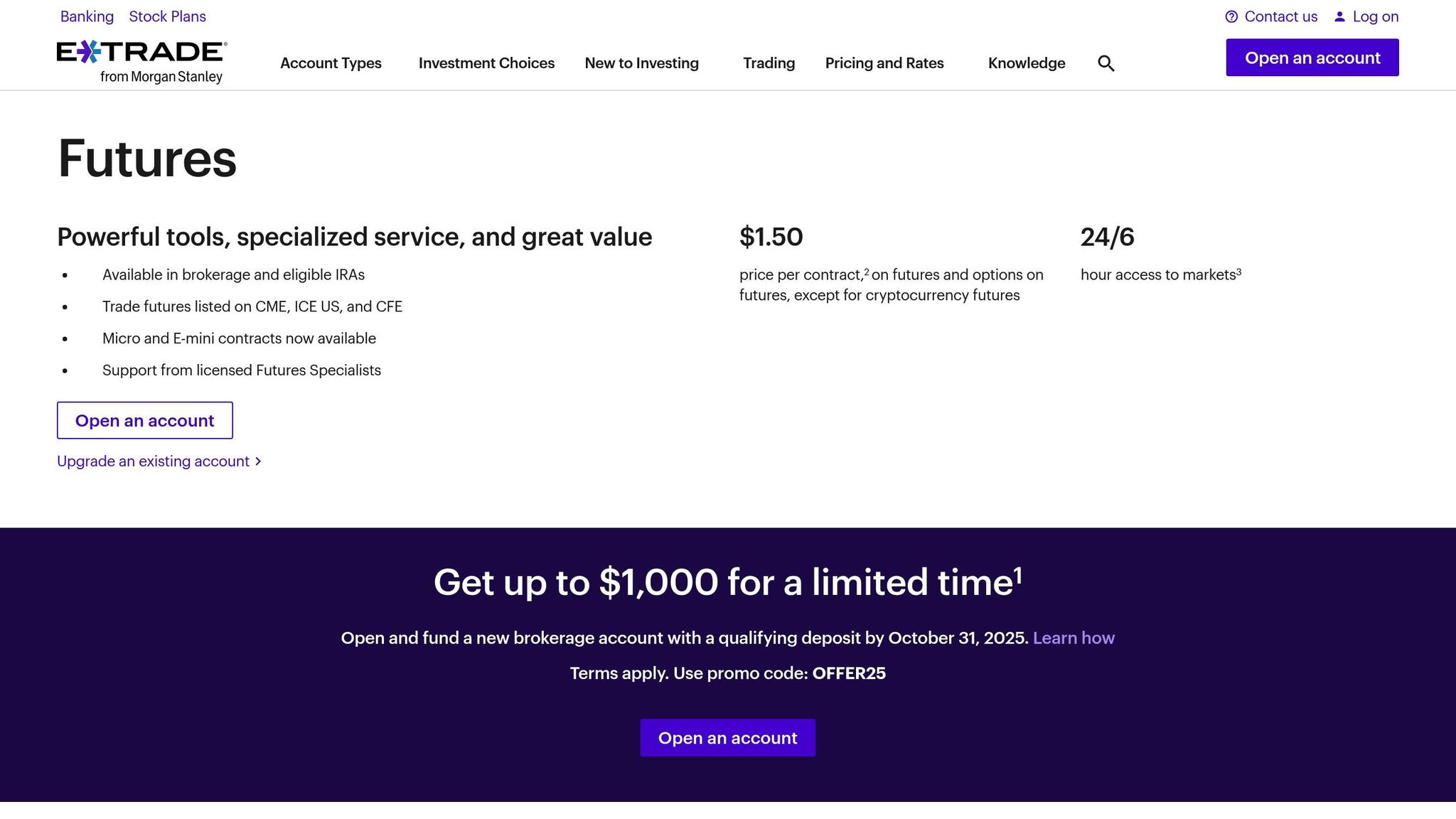
E*TRADE Futures, backed by a well-established financial institution, offers a straightforward platform for futures trading. With its clear fee structure and essential market tools, it aims to simplify the trading process. The platform also provides a rich library of educational materials and market analysis, helping traders refine their strategies and make informed decisions. E*TRADE stands out by emphasizing a no-frills fee model designed for efficient trading. For the latest details on commissions, account requirements, and fees, it’s best to reach out to E*TRADE directly. This commitment to simplicity and transparency keeps it competitive among discount futures brokers in 2026.
9. Charles Schwab Futures
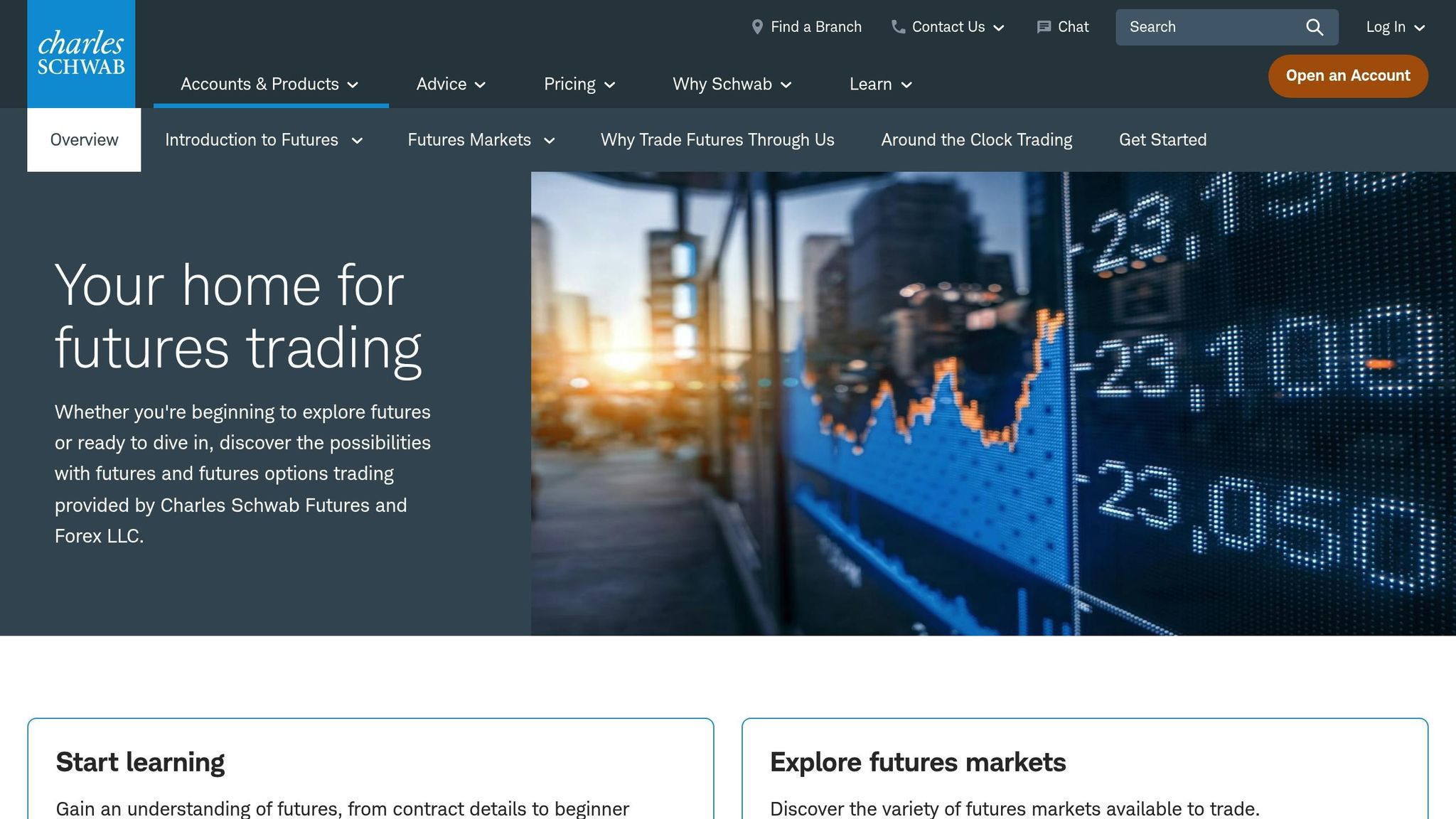
Charles Schwab Futures builds on a reputation of trust and expertise, offering a futures trading platform that integrates robust research tools with transparent pricing. It’s a solid choice for traders who value straightforward fees and access to in-depth market insights.
Commission Rates
Charles Schwab Futures maintains consistent per-contract fees across various futures markets, including commodities, indices, and currencies. This uniform pricing makes it easier for traders to estimate costs, especially when managing diverse portfolios.
STOP LOSING TO LATENCY
Execute faster than
your competition.
Sub-millisecond execution • Direct exchange connectivity • From $59.99/mo
Platform Fees
One standout feature is the absence of recurring platform fees. Traders can access real-time market data and advanced charting tools without worrying about extra charges, allowing them to focus entirely on their trading strategies.
Minimum Deposit
The platform requires a minimum deposit, ensuring that traders are adequately funded to handle the inherent risks of futures trading. This also provides access to Schwab’s full suite of financial services and research tools.
Additional Perks
Charles Schwab Futures enhances the trading experience with a range of research tools, such as market commentary, economic calendars, and commodity reports. Additionally, traders benefit from extended customer support and seamless integration with other Schwab services, making it a comprehensive option for futures trading.
10. Optimus Futures
Optimus Futures stands out with its clear and straightforward pricing, specifically tailored for active futures traders. Here’s a closer look at its commission structure, platform access, deposit requirements, and added benefits.
Commission Rates
Optimus Futures uses a tiered per-contract pricing model that adjusts based on your trading volume and account type. The rates include exchange and regulatory fees, giving traders a clear picture of their total costs from the start.
Platform Fees
Traders can access a variety of professional trading platforms without worrying about monthly fees. Market data is available at set rates, so you’re only charged for the data you actually use.
Minimum Deposit
The minimum deposit requirements are flexible, accommodating both individual traders and smaller accounts. The exact amount depends on your account type and trading preferences.
Additional Perks
Optimus Futures provides direct market access and personalized account management. Their team of experienced professionals is available to support your futures trading needs.
Broker Comparison: Pros and Cons
When choosing a futures broker, it’s important to weigh factors like commission structure, platform features, account requirements, service quality, and market access. These elements can directly impact your trading experience and potential savings in 2026.
Some brokers attract high-volume traders with competitive per-contract rates, while others bundle advanced trading platforms and analytical tools into their pricing. Platform options range from highly customizable tools designed for in-depth analysis to simpler setups that integrate seamlessly with broader investment services. For traders who value mobility, brokers offering robust mobile platforms stand out.
Account minimums are another key consideration. Brokers requiring higher initial deposits often provide premium services and better pricing, while others focus on lowering barriers to entry, making futures trading more accessible for retail investors.
Support services also vary widely. Full-service brokers, which typically charge higher fees, offer extensive educational resources and personalized support – features that are especially helpful for beginners. On the other hand, discount brokers keep costs down by limiting these services.
Technology infrastructure is another area where brokers differ. Some prioritize powerful systems capable of handling high-frequency trades and complex orders, while others focus on creating user-friendly interfaces and mobile accessibility. Additionally, brokers offering access to a broad range of international markets might provide better rates on specific contracts compared to those focusing solely on domestic exchanges.
Ultimately, the right choice depends on your trading style. High-volume traders often lean toward brokers with lower fees, while those trading less frequently may prefer platforms that are easy to use and come with strong support features.
Conclusion
The comparisons above highlight how different brokers cater to various trader needs in 2026. Picking the right discount futures broker comes down to matching your trading style with the fee structure and platform features that suit you best.
If you’re a high-volume trader, brokers like AMP Futures and IronBeam stand out with their competitive per-contract rates. Their focus on cost efficiency makes them ideal for those executing a large number of trades.
For beginners or occasional traders, options like Charles Schwab Futures and E*TRADE Futures might be more appealing. While their commission rates may be higher, they offer strong educational resources and intuitive platforms – tools that can help you sidestep costly mistakes as you learn the ropes.
Traders who depend on advanced technology, such as detailed charting and analytical tools, might prefer platforms like TradeStation or NinjaTrader. These brokers provide built-in, sophisticated software that could save you from needing additional subscriptions for analysis tools.
If you’re looking to diversify across multiple asset classes, Interactive Brokers offers a full-service platform with seamless integration for trading a variety of assets, including access to international markets.
When making your decision, take a close look at total monthly costs, including platform fees, data charges, and minimum deposit requirements. Testing out demo accounts or trial periods can also help ensure the platform aligns with your strategy. Switching brokers later can be both expensive and time-consuming, so it’s worth taking the time to get it right from the start.
Use these insights to find a broker that fits seamlessly with your trading goals and approach.
FAQs
What should I look for in a discount futures broker in 2026?
When picking a discount futures broker in 2026, it’s all about finding the right balance between cost, reliability, and functionality. Start by looking for brokers with low commission rates and fast, dependable trade execution. Make sure they provide access to key markets like the CME and are regulated by reputable organizations such as the CFTC or NFA to ensure your investments are secure.
Choose platforms that include advanced trading tools without tacking on hefty software fees. Flexible margin requirements and strong customer support can be game-changers, especially if you’re working with a smaller budget. Additionally, brokers with low account minimums can help you keep costs down. Focus on finding a broker that fits your financial goals and trading style while offering features that make your trading experience smoother and more efficient.
How do broker commissions and platform fees affect the cost of trading futures?
Broker commissions and platform fees can significantly impact the overall cost of trading futures. Commissions are usually charged per trade or contract, which means that for active traders, these expenses can add up fast. On top of that, platform fees – like monthly account maintenance charges or fees for accessing real-time market data – can further increase the financial burden, even for those who trade less frequently.
To keep trading costs under control, it’s crucial to pick a broker with low commission rates and minimal or no platform fees. This helps traders hold on to more of their earnings and manage their trading budgets more effectively. Choosing a cost-conscious broker is a smart way to trade while keeping unnecessary expenses at bay.
What are the best futures brokers for beginners who want helpful tools and resources?
For those stepping into the futures market in 2026, a few brokers make the process smoother with beginner-friendly tools and educational resources. NinjaTrader stands out by offering top-notch trading education, real-time customer support, and easy-to-use platforms that help new traders start their journey with confidence. On the other hand, E*TRADE excels in providing a variety of learning materials and tools specifically designed to simplify the complexities of futures trading for newcomers.
These platforms are great options for beginners looking for an affordable and accessible way to learn the ropes while building a solid foundation in the futures market.






